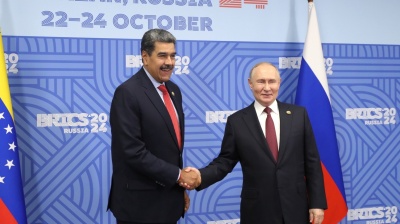The International Monetary Fund has clarified that El Salvador's continued Bitcoin accumulation remains consistent with its Extended Fund Facility (EFF) programme, despite the Central American country's cryptocurrency portfolio recently swelling beyond $760mn as Bitcoin rallied above $120,000.
During a press briefing on July 24, IMF spokesperson Julie Kozack told bne IntelliNews that while "the total amount of Bitcoin held across government-owned wallets remains unchanged," the accumulation by El Salvador's Strategic Bitcoin Reserve Fund "is consistent with programme conditionality" as it relates to "movements across various government-owned wallets."
The clarification emerges as El Salvador maintains over 6,237 Bitcoin purchased at an average price of roughly $42,000, based on Coinotag tracking data. Bitcoin's recent climb past $122,000 has pushed the country's digital asset portfolio to nearly triple its original purchase value, in a win for President Nayib Bukele's audacious cryptocurrency bet.
Bitcoin's rally has been driven by growing institutional adoption and clearer US regulatory frameworks, with lawmakers passing the country's first major national cryptocurrency legislation last week. The Genius Act, which US President Donald Trump signed into law on July 18, establishes regulatory standards for stablecoins and represents a watershed moment for the digital asset industry.
"We are continuing to very actively monitor developments of stablecoins. We are assessing the potential implications of the Genius Act. For us at the IMF, what is going to be especially important are the implications for the international monetary system and the potential for spillovers to other jurisdictions. That work is ongoing and our teams are making those assessments at this time," Kozack told reporters during the briefing.
The momentum has been amplified by Trump's supportive cryptocurrency policies, lifting the entire digital asset sector to roughly $3.8 trillion in market capitalisation.
The gains coincide with El Salvador's successful completion of its first IMF programme review on June 27, unlocking an immediate $118mn disbursement and raising total programme funds received to $231mn from the 40-month Extended Fund Facility valued at $1.4bn.
Kozack said that "programme performance has been solid in El Salvador" with economic growth continuing "as macroeconomic imbalances are being addressed." She added that critical fiscal and reserve benchmarks were achieved "with margins" and noted "substantial progress" on the country's "ambitious reform agenda in the areas of governance, transparency and financial resilience."
Significantly, the Fund maintains that "risks from Bitcoin continue to be mitigated," indicating the IMF has developed mechanisms to reconcile El Salvador's cryptocurrency approach with conventional lending standards.
The IMF's Executive Board had earlier stated in June that "efforts should continue to keep the public sector's holdings of Bitcoin unchanged" and advocated for the "early unwinding of the public sector's participation in the government's e-wallet (Chivo)." Yet Kozack's recent remarks suggest the Fund differentiates between aggregate holdings and redistributions among government-managed wallets.
El Salvador's digital currency strategy has shifted considerably since 2021, when it pioneered Bitcoin adoption as legal tender. Earlier this year, Bukele's legislature eliminated the mandatory Bitcoin payment requirement, satisfying a critical IMF stipulation while retaining the state's capacity to maintain cryptocurrency reserves.
The adept handling of IMF requirements alongside Bitcoin accumulation offers political space for Bukele's government as it reconciles digital asset ambitions with conventional international financing structures. The programme focuses on fiscal consolidation, reserve rebuilding, and governance improvements to foster sustainable economic expansion.
Nevertheless, in its recent assessment, the IMF has flagged potential headwinds from "escalating global trade tensions and tighter immigration policies elsewhere" that could harm remittance flows and economic performance. In this context, the Fund has stressed maintaining reform discipline and preparing contingency measures.
El Salvador's cryptocurrency gains appear to establish a framework for how sovereign digital asset reserves can function as legitimate portfolio diversification tools for nations, contingent on maintaining adherence to international financial commitments.
The country's success in meeting IMF programme criteria while capitalising on Bitcoin's substantial appreciation shows that cryptocurrency policies and multilateral lending relationships can coexist, potentially creating pathways for other countries eyeing comparable strategies.
The ongoing test will be preserving this careful equilibrium during periods of Bitcoin volatility, challenging both El Salvador's fiscal stability and the IMF's comfort level with non-traditional reserve holdings.
News

US prepares attack on Venezuela as Maduro begs Putin for aid
The Trump administration has reportedly drawn up a list of potential military targets within Venezuela as part of its intensifying pressure on President Nicolás Maduro, who has turned to Moscow seeking urgent military assistance.

Bulgaria suspends fuel exports to EU after US sanctions Lukoil
Bulgaria has temporarily suspended exports of petroleum products to European Union countries after the United States imposed sanctions on Russian oil giant Lukoil.

Tens of thousands rally in Serbia's Novi Sad one year after deadly station collapse
Tragedy that killed 16 people has become a symbol of public anger over corruption and negligence, fueling Serbia’s largest protest movement in more than a decade.

US push to pressure Iran providing fresh incentive for trans-Caspian pipeline
Turkmenistan showing interest in the idea.

_Cropped.jpg)
_1761305900.jpg)
_1759927176.jpg)
